Understanding Pool Tile Maintenance in Georgia
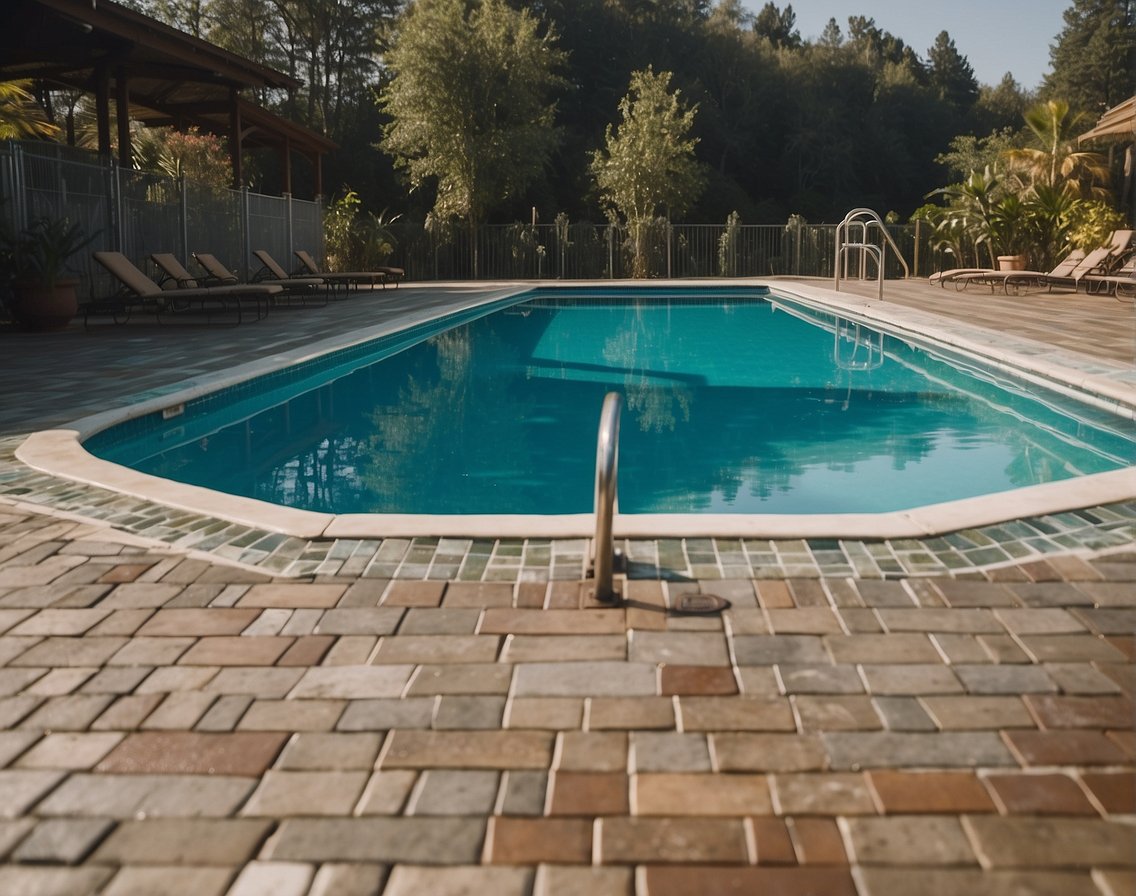
Maintaining clean and hygienic pool tiles is a crucial aspect of swimming pool care in Georgia. Our focus here centers on the necessity of routine upkeep and the identification of common tile issues.
Importance of Regular Maintenance
Routine maintenance is key to ensuring that our swimming pool remains a safe and enjoyable place. We consider consistent upkeep to not only extend the longevity of pool tiles but also to safeguard against hygiene-related concerns.
- Preventing Algae Growth: Regular cleaning stops algae from taking hold on tiles, maintaining a clean aesthetic and preventing slippery surfaces.
- Calcium Buildup: In Georgia’s hard water areas, frequent maintenance wards off calcium deposits that can lead to unsightly scaling.
- Filtration Efficiency: Clean tiles contribute to overall pool cleanliness, which in turn reduces stress on filtration systems.
Monitoring these aspects helps us keep the pool in prime condition.
Identifying Common Pool Tile Problems
Georgia’s pool tiles often face several common issues that we must identify to address effectively.
- Staining: Tiles can develop stains from dirt, leaves, or metals in the water. Such discolorations often indicate a need for chemical adjustment or surface cleaning.
- Calcium Deposits: Hard water in our region can lead to calcium carbonate deposits, recognizable as white or gray scaling, which will require specific treatments to remove.
- Algae Proliferation: Insufficient maintenance can lead to algae clinging to the tiles, presenting a hygiene issue and degrading aesthetic appeal.
- Grime and Dirt Accumulation: Without regular brushing and vacuuming, grime can accumulate, making the pool uninviting.
Recognizing these issues early on helps us to apply the correct maintenance techniques to keep our pool tiles pristine.
Effective Cleaning Techniques for Pool Tiles
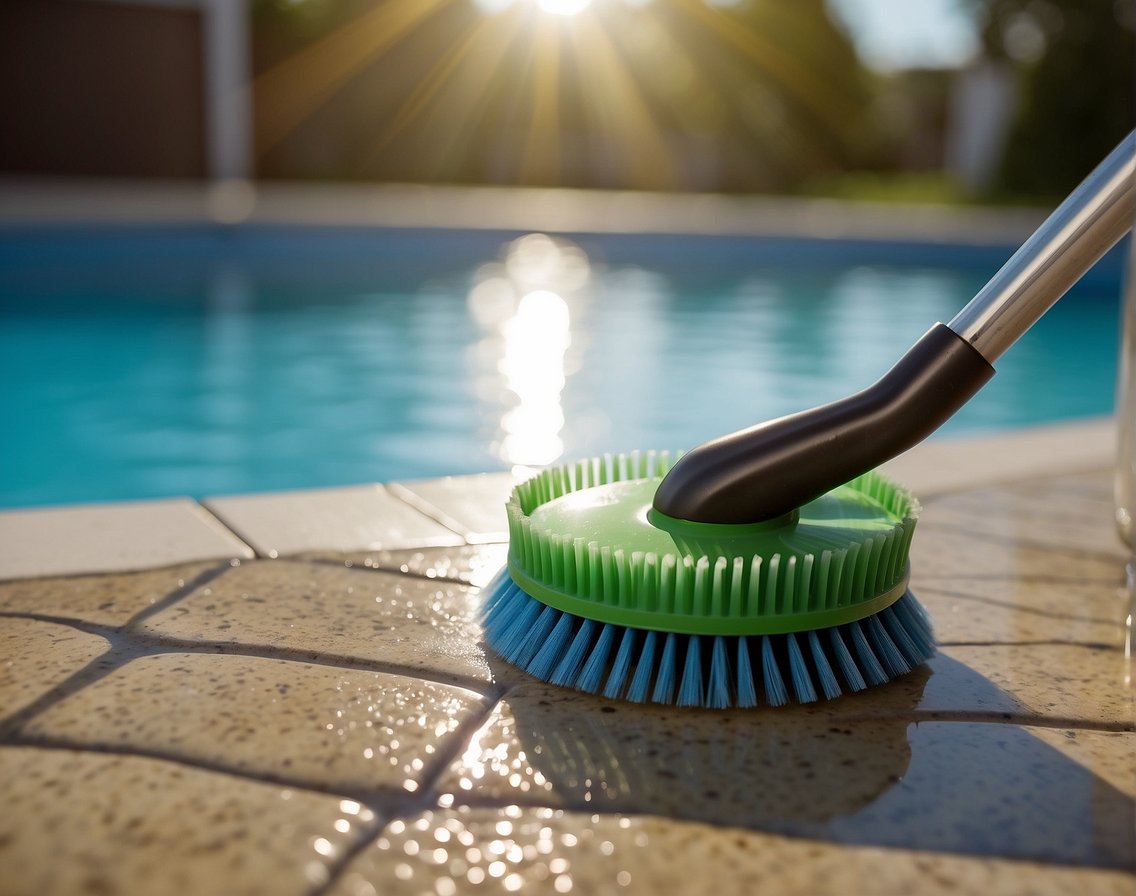
Ensuring clean and hygienic swimming pool tiles involves a combination of manual efforts, chemical treatments, and professional services. We will guide you through each approach to maintain your pool’s aesthetic and health standards.
Manual Cleaning Strategies
Our first step includes frequent brushing to prevent the buildup of algae and other deposits. A nylon bristle brush is ideal for ceramic or porcelain tiles, while a pumice stone can be effective for tougher stains:
- Regular Brushing: Daily brushing prevents algae proliferation.
- Pumice Stone: Gently rub on stubborn spots without scratching tiles.
For early signs of calcium or lime:
- Apply white vinegar directly to affected areas.
- Leave for a few minutes to loosen deposits.
- Scrub gently and rinse off with pool water.
Chemical Treatments and Solutions
We maintain water chemistry by periodically testing pH and calcium levels. This is essential as an imbalance can lead to scaling and staining. Here’s our approach:
- pH and Alkalinity: Aim to keep pH between 7.2 and 7.8.
- Calcium Remover: Use a commercial calcium remover following manufacturer’s instructions.
For more persistent issues:
- Muriatic Acid: Dilute properly and use it to dissolve tough calcium deposits.
When handling chemicals, always use protective gear.
Pressure Washing and Professional Services
Pressure washing offers a deep clean for our swimming pool tiles, dislodging grime that manual cleaning can’t reach:
- Pressure Washing: Best for non-porcelain tiles, using lower pressure settings.
We resort to professional pool tile cleaning services for extensive maintenance or when dealing with extremely stubborn stains and calcium build-ups. Professionals bring:
- Advanced Equipment: Ensuring thorough and safe cleaning.
- Expertise: Knowledge of the best techniques for different tile types.
They are equipped to handle any unforeseen challenges that come with tile maintenance and algae prevention while ensuring the longevity of our pool tiles.
Maintaining Water Chemistry and Pool Environment
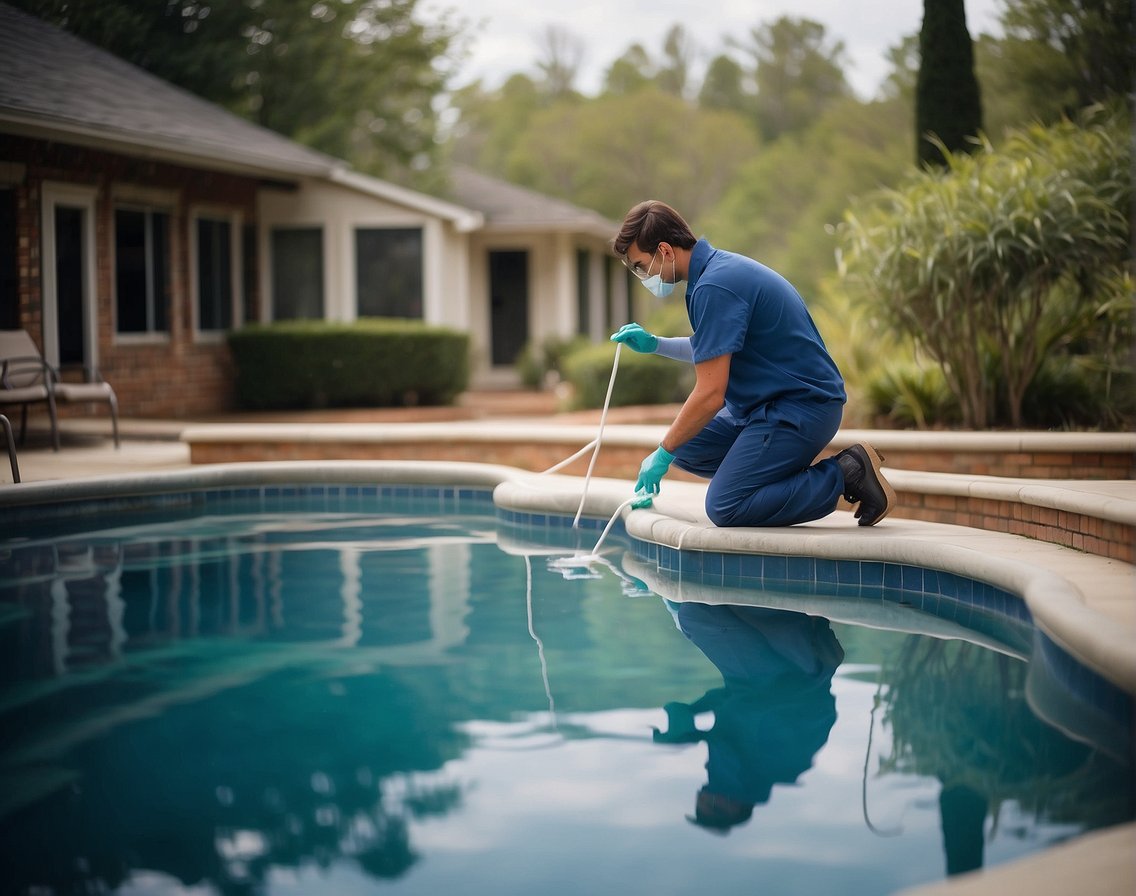
To ensure the cleanliness and integrity of swimming pool tiles, we must prioritize water chemistry and the surrounding pool environment. Consistently balanced pool water directly impacts the longevity and hygiene of pool tiles.
Balancing pH and Alkalinity Levels
Balancing the pH and alkalinity levels in our pool is crucial for protecting the swimming pool tiles and ensuring the comfort and safety of swimmers. The ideal pH level for pool water is between 7.2 and 7.8, promoting optimum chlorine effectiveness and swimmer comfort. To maintain the correct pH levels, regular testing should be conducted with test strips or a test kit. The alkalinity levels, serving as a pH buffer, should be kept within the range of 80 to 120 parts per million (ppm). We can adjust these levels using pH increasers or decreasers to manage the overall water balance.
pH Levels:
- Ideal Range: 7.2 – 7.8
- Testing Frequency: 1-2 times per week
- Corrective Measures: pH increasers/decreasers
Alkalinity Levels:
- Ideal Range: 80 – 120 ppm
- Testing Frequency: 1-2 times per week
- Corrective Measures: Alkalinity increasers/decreasers
Controlling Calcium Hardness and Mineral Buildup
Calcium hardness must be controlled to prevent white residue and damage to our swimming pool tiles. The desired calcium hardness level in pool water is typically between 200 and 400 ppm. If calcium levels are too high, we might notice a white, scaly buildup on the tiles, which can be removed using a pool tile cleaner specifically designed for calcium removal. To reduce calcium levels, we can utilize a hardness reducer or partially drain and refill the pool with softer water. Conversely, if calcium levels dip too low, we add a calcium hardness increaser to prevent potential damage to the pool finish.
Calcium Hardness Levels:
- Ideal Range: 200 – 400 ppm
- Testing Frequency: Monthly
- Corrective Measures: Hardness reducers, partial water replacement, calcium hardness increaser
Regular monitoring with the right tools and timely maintenance is essential. Use a filter to keep water circulating and clean, ensure proper chlorine levels to maintain a hygienic environment, and establish a maintenance schedule to keep our swimming pool tiles in pristine condition.
Preventing Damage and Ensuring Longevity
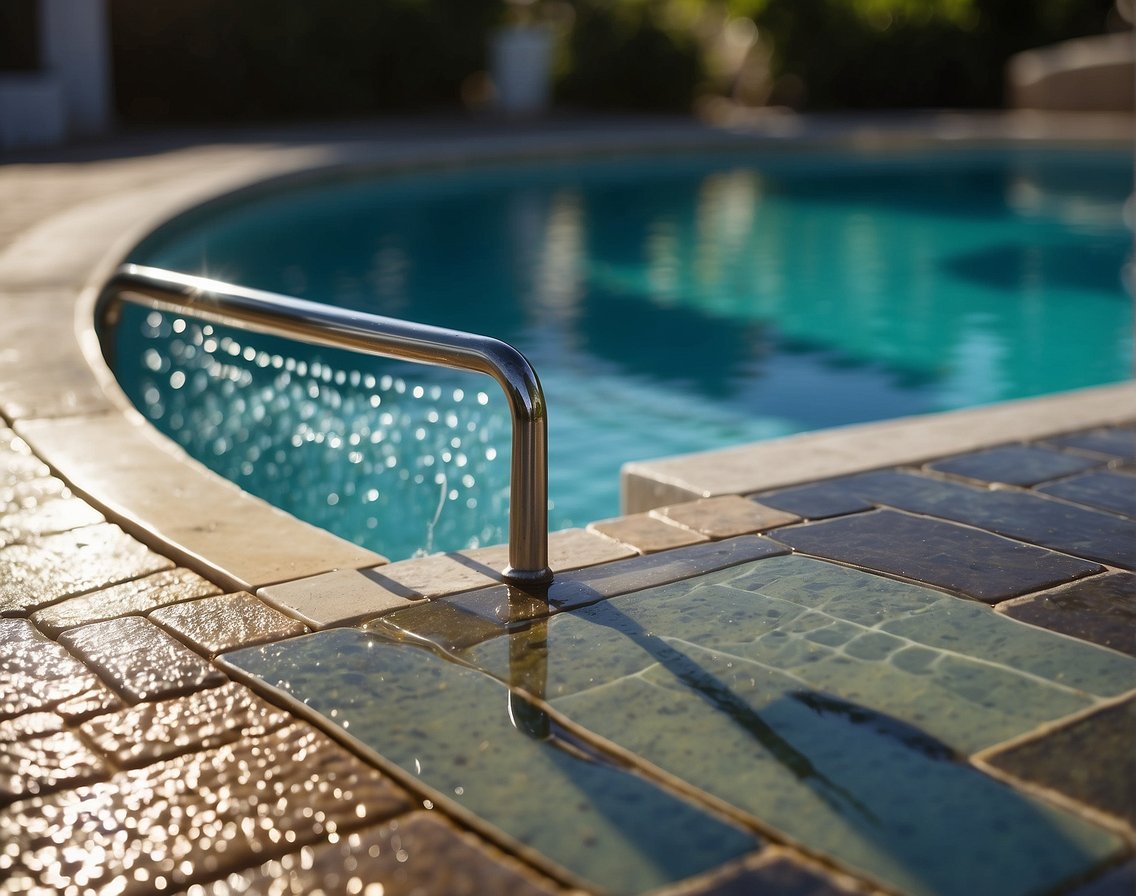
In maintaining clean and hygienic pool tiles, it’s crucial to prevent damage and ensure the longevity of your swimming pool. We’ll discuss how regular inspections and timely repairs, along with seasonal adjustments specific to Georgia’s climate, can contribute to the enduring beauty and safety of your pool tiles.
Routine Inspections and Repairs
To maintain the integrity of your pool tiles, we recommend establishing a schedule for routine inspections. Look for signs of wear, such as cracks, chips, or discoloration that might indicate underlying issues.
- Cracks or Chips: Small cracks can quickly become larger issues, allowing water to seep behind tiles and compromise their adhesion. Repair these promptly to prevent water damage.
- Discoloration: Can be an indicator of chemical imbalance or buildup of residue. Addressing this early helps preserve the beauty of the tiles.
Incorporating these checks into your regular maintenance routine can significantly reduce the likelihood of extensive repairs later on.
Seasonal Adjustments for Georgia Climate
Georgia’s climate poses unique challenges to pool maintenance due to its hot summers and mild winters. Heat can amplify the effects of harsh chemicals on your tiles, leading to premature fading or degradation.
- Summer: Ensure that the water chemistry is balanced to prevent tile damage from harsh chemicals. Adjust your cleaning schedule to avoid the peak heat hours, reducing the evaporation of cleaning products which might leave residue.
- Winter: Although mild, it’s safe to periodically check for frost damage that can lead to tile cracking. Protect your tiles by maintaining consistent water levels and ensuring the pool’s surface remains clean from debris.
By implementing these seasonal strategies, your pool tiles will be better equipped to handle Georgia’s weather, ensuring their longevity and preserving their beauty for years to come.
Incorporating Pool Tile Upkeep Into Overall Pool Care
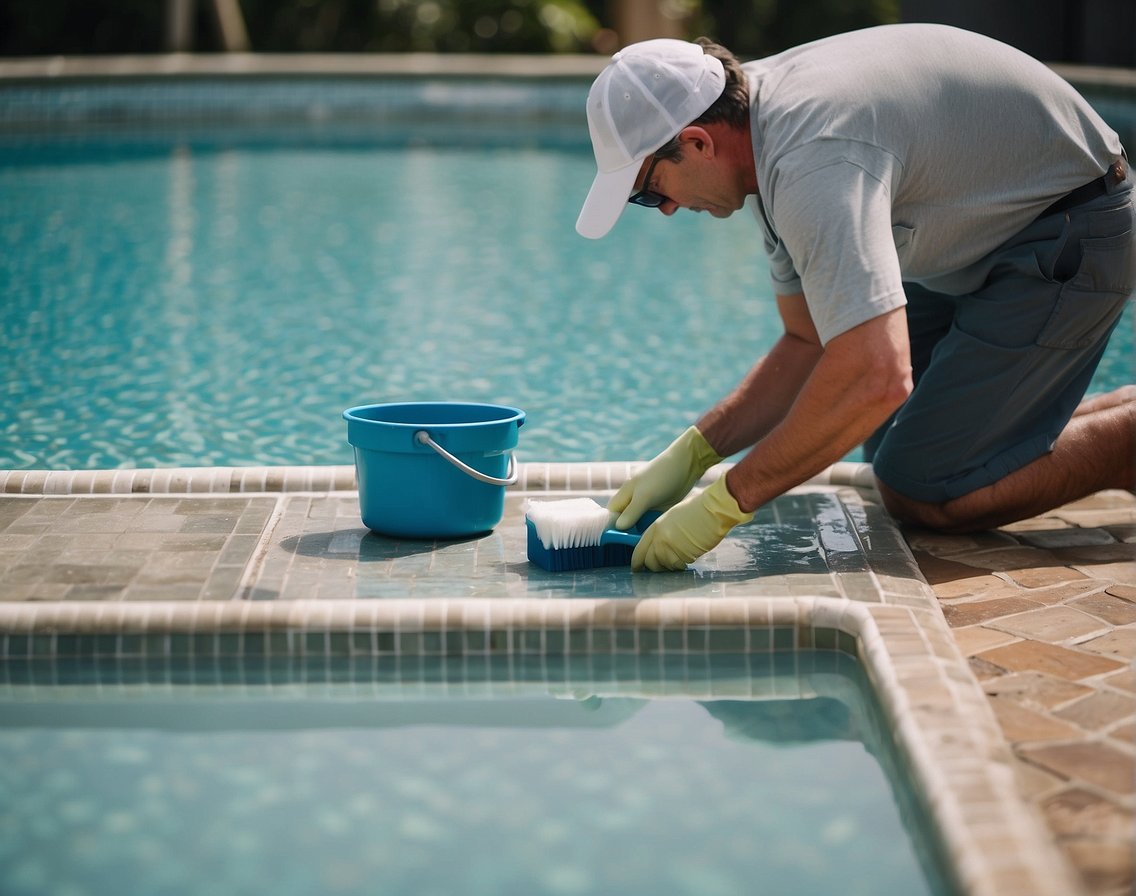
Keeping pool tiles clean is an essential part of overall pool maintenance that prevents buildup and staining, ensuring a visually appealing and hygienic swimming environment. Effective tile care also protects against the long-term costs associated with extensive repairs and contributes to the health and safety of swimmers by preventing the spread of illnesses and infections.
Daily and Weekly Cleaning Tasks
Daily Tile Maintenance:
- Skimming: Quickly remove leaves and debris from the pool surface daily to prevent them from sinking and staining the tiles.
- Inspection: Check for any evident tile issues, such as cracks or algae growth, that require immediate action.
Weekly Tile Maintenance:
- Brushing: Gently brush the pool tiles weekly to remove calcium deposits and prevent algae buildup.
- Pool Vacuuming: Regularly use a pool vacuum to keep the pool floor and walls clean and free from debris.
Integrating Tile Care with General Pool Maintenance
Water Circulation and Chemical Balance:
- Chemical Testing: Ensuring proper chemical levels through weekly testing helps maintain a clean environment, safeguarding the pool tiles’ integrity.
- Water Circulation: Run the pump every day to prevent debris from settling on the tiles and disrupting water balance.
Professional Pool Services:
- Scheduled Maintenance: Utilize professional pool cleaning services to deep clean the tiles and inspect for any issues that might require repair.
- Expert Consultation: Seek advice on the use of specialized pool chemicals and cleaning equipment to preserve tile quality optimally.
By attentively incorporating tile care into our daily and weekly pool maintenance routines, we can achieve a consistently clean and inviting swimming pool while averting more costly repairs and potential health risks.
Frequently Asked Questions
When maintaining pool tiles in Georgia, it’s crucial to understand both the cleaning methods and the local climate’s impact on our routine. We’ve compiled a list of the most common inquiries to ensure your pool tiles remain clean and hygienic.
What is the most effective method to clean mosaic pool tiles?
For mosaic pool tiles, we recommend using a non-abrasive cleaning solution and a soft-bristle brush. Gently scrubbing the tiles in a circular motion works best to remove algae and calcium deposits without damaging the tiles.
Can you outline the steps for proper ceramic pool tile maintenance?
Certainly. Begin by lowering the pool water level to expose the tiles. Then, apply a tile cleaner specifically designed for ceramic and scrub with a soft brush. Rinse thoroughly with water afterward and ensure no cleaner residue remains. Periodically check for any cracked tiles and replace them as needed.
How frequently should you perform deep cleaning on pool tiles?
We advise a deep cleaning of pool tiles at least twice a year. However, inspecting tiles monthly for signs of buildup and addressing as necessary will greatly benefit their preservation.
What are the recommended maintenance routines for ensuring longevity of pool tiles?
To ensure longevity, weekly brushing of the tiles to remove minor debris and prevent calcium deposits is essential. Also, maintaining proper pH and alkalinity levels in your pool water helps prevent staining and etching of the tiles.
What precautions should be taken when using chemicals to clean pool tiles?
Always wear protective gear, such as gloves and goggles, when handling pool chemicals. Follow the manufacturer’s instructions for dilution and application. Never mix different cleaning agents, as this can create hazardous reactions.
Is there a preferred time of year for pool tile maintenance in Georgia’s climate?
In Georgia, the best times for intensive pool tile maintenance are spring and fall. During these seasons, mild temperatures make it comfortable to work outdoors, and the pool is less likely to be in heavy use compared to the summer months.
